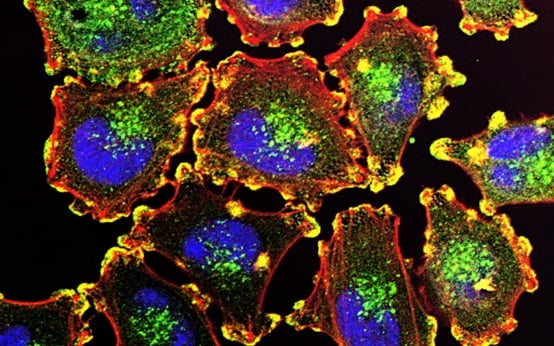News
02 March 2022
Melanoma Research Victoria is a collaborative clinical cohort designed to facilitate melanoma research. MRV’s mission is to improve outcomes for melanoma patients through supporting research using data, biospecimens and the collaborative power of participants with lived melanoma experience
Peter Mac-led research has discovered a new way some melanomas become resistant to targeted therapies. The study, published overnight in Nature Communications, found that if a new pathway that controls the melanoma cells' metabolic switch could be deactivated, it will delay the patient's melanoma becoming resistant to these treatments. A major advantage of targeted therapies – which target a specific gene mutation in a patient's cancer – is that initially they get high response rates, with fewer side effects. The research was specifically looking at melanomas with a BRAF mutation, which occurs in roughly half of all melanomas. "Approximately 80 per cent of patients with these BRAF-mutant melanomas will respond to targeted therapies at first, but unfortunately these treatments don't provide a cure," says Dr Lorey Smith, the lead author of the research. Most patients will ultimately relapse – the majority within a year or two – because the residual cancer in their body develops resistance to treatment. "In some cases, there are no changes in the genetics of these cancer cells, but changes in how their mRNA is processed and turned into proteins," says Dr Smith. Essentially, the melanoma gets smarter in response to the treatment and learns how to outwit it, by reprogramming the cancer cell's metabolism. Developing this adaptive resistance allows some melanoma cells to survive and stay in the body, until there are favourable circumstances for them to start multiplying again. But by finding a new pathway that controls the cancer cells' metabolic switch, the researchers were able to knock out another of the melanoma's potential fuel sources. "Essentially, when we switch off this pathway, we're starving the melanoma cells," says Dr Smith. "We switch off the proteins that the melanoma needs to adapt and develop resistance to the treatment." This means targeted therapies would be effective for longer. "While our work is in melanoma, we actually think that these findings are going to be generally applicable to any BRAF-mutant cancer treated with these types of targeted therapies," says Dr Smith. The researchers are also trying to develop a drug that directly targets this protein they found, that seems to play an important role in these melanomas developing this type of adaptive non-genetic resistance. This research was undertaken with support from Peter Mac core facilities: the Victorian Centre for Functional Genomics, Molecular Genomics, Flow Cytometry and the Centre for Advanced Microscopy and Histology. Contacts: For more information contact the Peter Mac Communications team on 0417 123 048. About Peter Mac Peter MacCallum Cancer Centre is a world-leading cancer research, education and treatment centre and Australia's only public health service solely dedicated to caring for people affected by cancer. Image: Metastatic melanoma cells. Credit: Julio C. Valencia, NCI Center for Cancer Research

